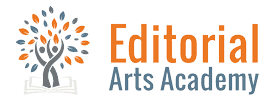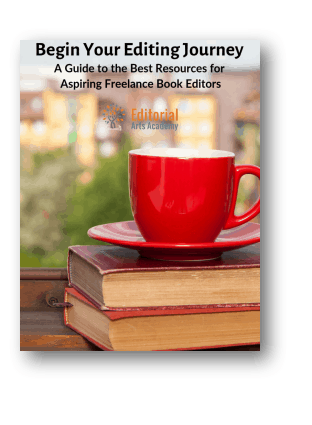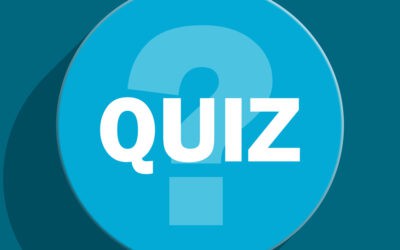Or: “I can’t spell—I could never edit books.”
Or: “I don’t have the skills to work directly with authors—or the confidence!”
What these people don’t know—and you, too, may not—is that there are many different kinds of editing jobs for freelance book editors, and not all of them require expertise in spelling or grammar or working directly with authors.
In fact, there are seven editorial roles you can fill, each with specific skills and tasks. You can choose to do just one or you can do a few, carving out a side hustle or full-time career editing the books that you love to read.

Different Kinds of Book Editing
A bird’s-eye view shows us that the editorial process, and, in turn, the seven editorial roles, fall into two distinct groups: the content edit and the language edit.
The content edit happens at the early stages of the editorial process and focuses on the book’s structure, organization, plot elements, character arcs, and other macro-level issues. The language edit happens at a later stage and focuses on the book’s mechanics, as conveyed through words, sentences, and paragraphs. Most freelancers specialize in either the content edit or the language edit—although some do both.
In the content edit, you’ll find these roles: book coach, beta reader, manuscript evaluator, and developmental editor. In the language edit, the roles are line editor, copyeditor, and proofreader.

Content Edit: Early Stage
Role 1: Book Coach
An author may need ongoing support to take their project from initial idea to fully developed first draft, and this is the job of a book coach. The book coach role is a little confusing because a coach can actually enter at any point during the content edit. Sometimes an author hires a book coach to help them get that first draft completed. Other times, authors write a first (or second, or third) draft, get it evaluated and/or beta read, and then decide to use a coach to make the deep revisions.
Book Coach: Rewards and Challenges. Book coaches get to support and motivate authors as they work to realize what is often a lifelong dream, and get paid well in doing so. A challenge is dealing with people who struggle with self-doubt and other difficult emotions during the creative process. Excellent people skills are needed for this role.

Book coaches support an author to write a manuscript that’s ready for editing.
Role 2: Beta Reader
In this early stage of the process, an author may seek a reader’s impression in broad strokes (liked it, didn’t like it, etc.). The role of the beta reader is similar to that of book reviewer: they provide feedback but not direction. Many writers use friends, family, and a writing group for beta readers, but others hire this service to ensure a knowledgeable critique performed on time. Beta reading is mostly done on fiction, particularly genre fiction.
Beta Reader: Rewards and Challenges. You get paid to read books in your favorite genre. But it doesn’t pay much.
Role 3: Manuscript Evaluator
A manuscript (MS) evaluation (also called MS assessment, editorial assessment, or MS critique) is composed of a feedback letter of three to ten pages that provides direction for the author to improve their book. The MS evaluator might also recommend the next step for the MS—whether it needs developmental editing, line editing, or a broader approach involving the skills of a book coach.
Manuscript Evaluator: Rewards and Challenges. In addition to getting paid to read books you like, you can flex your writing craft muscles in your assessment of what works and what doesn’t, and explain this to the author. The challenge is to not get into a full-blown developmental edit here; the lines can be blurry between MS evaluation and the more lengthy developmental edit.
Role 4: Developmental Editor
The developmental editor enters when a MS has not yet been fully developed. Think of a MS evaluation as a 5K run and a developmental edit as a marathon. Not only does the editor write a detailed editorial letter of ten to twenty pages, but they also provide page-by-page commentary in the text. At this stage, an editor might also create a book map or outline, to represent the book’s contents.
Developmental Editor: Rewards and Challenges. Developmental editors are in on the creative process, now with a focus on shaping the content, organization, plot, and characters of the book. Like book coach, the pay is often higher than for other editorial roles. A challenge is staying with the author’s message and story and not going off on a tangent with your own ideas. Knowing your boundaries and being comfortable with querying the author frequently are two much needed people skills for this role.
Language Edit: Later Stage
Role 5: Line Editor
A line editor scrutinizes every sentence in a MS to determine if it belongs, reads well, and is correct. The primary focus is on making words and sentences clear in meaning, and eliminating inconsistencies. The line editor also seeks to improve the author’s style by focusing on word choice, sentence structure, and the text’s “musicality.”
Line Editor: Rewards and Challenges. Here you are “polishing the gem” by using your skill with language to improve the message or story. A challenge is being accurate while bringing clarity and not misinterpreting the author.

Line editors attend to the paragraphs, sentences, and words of the manuscript, making the text more effective and interesting.
Role 6: Copyeditor
The copyeditor focuses on the mechanical side of editing, addressing grammar, spelling, and punctuation and using the Chicago Manual of Style as their guide. They also ensure consistency (are Jose’s eyes green on p. 14 and p. 214?) and sometimes perform a fact-check (is the Museum of Modern Art on W. 53rd Street?). Copyeditors also create style sheets.
Copyeditor: Rewards and Challenges. If you have a head for grammar, punctuation, and spelling, copyediting can be a lot of fun. Of course, it’s not just applying rules; a good copyeditor applies the rules judiciously. A challenge is that it can be exhausting as your only job because it takes a lot of concentration.
Role 7: Proofreader
A proofreader’s work begins after a book has been copyedited, formatted in a book design program, and (in many cases) typeset for publication. Proofreaders give the typeset text a final line-by-line scan to catch major editorial errors, typos and misspellings, and formatting issues.
Proofreader: Rewards and Challenges. Proofreading can feel the most like reading for pleasure, especially if the book was well edited. A challenge is that you need to understand which errors to mark and which to leave alone, and that can be puzzling at first.
What Editorial Role Is Best for You?
Susannah and I specialize in different areas, each focusing on different roles. As a book coach, developmental editor, and line editor, I work in the content edit roles and language edit roles (but mostly content edit). Susannah is primarily a copyeditor and proofreader, so her work is on the language edit side.
To find out the best one for you, take our Editor Profile Quiz to determine which of the four editor profiles you most closely fit. From there, you can match up your profile to your ideal role or roles.
I hope you can now see that there’s a huge playing field for people who want to make a living as a freelance book editor. If some of the roles don’t line up with your skills and passions, perhaps others will.
Maybe you love to dissect storylines but don’t care for grammar? You might thrive as a developmental editor, or another role within the content edit side.
Or maybe you find typos and grammar errors all over the place but don’t feel qualified to wade into the waters of concept and story development? In that case, you could be an ideal copyeditor, or something else within the language edit.
If you’re interested in book editing but worried you don’t have what it takes, explore all the roles before closing the door on this rewarding career. A great way to dive in to the research process is with our free ebook, Begin Your Editing Journey: A Guide to the Best Resources for Aspiring Freelance Book Editors. Get the ebook here.
Get our free ebook to begin your research into the seven editorial roles.




